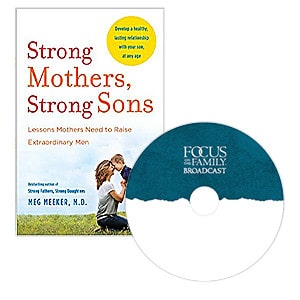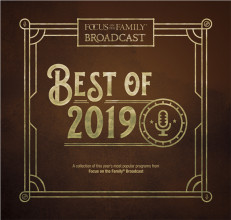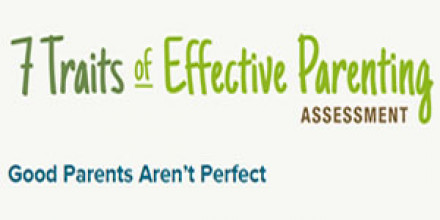
The War of Words
In this Adventures in Odyssey drama, a carelessly uttered word from Eugene creates havoc as it becomes the fashionable insult, resulting in a lesson about the power of words.
Home » Episodes » Focus on the Family Broadcast » Raising Boys to be Godly Young Men (Part 2 of 2)
On this Best of 2019 broadcast, Dr. Meg Meeker offers moms with boys encouragement and advice in a discussion based on her book Strong Mothers, Strong Sons: Lessons Mothers Need to Raise Extraordinary Men. She explains how a mom can bolster her son's confidence, navigate conflict as he matures, and avoid becoming overprotective and finding her identity in her children. (Part 2 of 2)
Teaser:
Dr. Meg Meeker: And here’s what happens to young boys, as they’re going through adolescence. There comes a time where – I don’t know if they wake up in the morning, and it happens in one day, or over a week, or over a couple months – where they look at their mom, and they go, “I really love her. I confide in her. We have this really wonderful relationship. But something feels kind of creepy.
End of Teaser
John Fuller: You’ll hear more from D. Meg Meeker today on Focus on the Family about being a great mom to your son.
Your host is Focus president and author Jim Daly. I’m John Fuller. Thanks for joining us. This is a Best of 2019 broadcast. We had a lot of great response to it.
Jim Daly: Well, there’s obviously a great need for this type of content because moms really engaged with it and we heard from many moms about this program.
Numerous studies have shown that when a boy has a secure attachment to his mom, he is psychologically healthier, stronger and even braver. Isn’t that interesting?
John: It is.
Jim: That comes from mom. You wouldn’t think that, but it goes on to say he will have higher self-esteem, do better in school and have lower rates of mental and behavioral disorder if that relationship is strong. So, moms, you play a big role in your son’s life, and that’s what we’ll be talking about today.
God’s Word also backs this up, the importance of moms in raising godly sons. Proverbs says, “Her children rise up and call her blessed.”
And here at Focus we want to be there for you at every age and stage. And that’s why we cover topics like this to help you be the parents you want to be and to have a strong family.
John: And Dr. Meg Meeker is committed to that same kind of goal. She’s been practicing pediatrics and adolescent medicine for over 30 years and is a prolific author and speaker. She’s the mom of four adult children. And has written a great book that we’ll be talking about today, Strong Mothers, Strong Sons: Lessons Mothers Need to Raise Extraordinary Men. And, of course, we’ve got that at focusonthefamily.com/broadcast
Here now is that conversation with Dr. Meg Meeker on Focus on the Family.
Jim: Meg, welcome back to Focus.
Meg: Well, thanks so much for having me.
Jim: Okay, we left off last time with some provocative thoughts about your son, Walter, saying, “Mom, stop trying to fix me,” which I thought was great. And other provocative things that you said in there, like the war statement. You can expect a war. And you were really good at giving moms practical advice on not only anticipating the war, but how to equip yourself to do the right job as a mom during that emotional battle that you want your son to have with you. Just even framing it that way is so good. Expect it, it’s going to come and it’s important for him in developing his masculinity…
Meg: Right.
Jim: … to separate from you.
You know, Meg, let me ask you this question, right at the top here, because we always want to be on the biblical perspective on this. So, as you read Scripture, as a pediatrician, as the woman who wrote this book, Strong Mothers, Strong Sons, what is that biblical perspective when it comes to motherhood? You know, you look at some of these stories in the Bible, like Jacob and Esau. So, mom aligns with Jacob – “Hey, do this. Put on some hairy goatskin and go into your dad. He doesn’t see very well. Let him think you’re Esau, so he’ll give you the firstborn blessing.” I mean, there are some bizarre mother-son relationships in Scripture. But how do you see that part of it, the faith element, God’s design, for a mom and for her son?
Meg: I think if we keep the order of family right, we won’t go wrong. And mothers align with their sons to try to pull away from the dad. When you have a mother who’s aligning with her son, she’s really undermining the dad in the family. So, what happens is the order in the family may go something like this – God, mom and kids, dad. And that’s not the way it’s supposed to be. And we make our relationships with our kids – mothers particularly with their sons – an idol. And that’s…
Jim: This is going to cut to the core of some moms.
Meg: But it’s important. It has to be said.
Jim: So how should it go?
Meg: It should go God, mom and dad and then kids. And kids fit into the family structure. Kids don’t become the center of the family structure. Because when they do that and kids are an idol, it feels very natural for one parent to move in and align themselves with that idol, because it feels good, it looks good. We look like good mothers, who are standing up for our kids and fighting for our kids, because we want them to be so successful.
Jim: So, what’s that self-assessment look like for a mom who’s hearing this right now going, “Oh, OK, maybe – maybe I’m doing that”? What would be two or three questions she could ask herself?
Meg: I would say, how much time during the day are you thinking about your son and your kids, versus how much you’re thinking about your husband and your marriage?
How – in your prayer life, what do you pray for first, your kids or your husband? Ouch, I do that.
Jim: Yeah, you’re definitely crunching some toes here.
Meg: (Laughter)
Jim: I mean – seriously, I can feel it.
Meg: But it’s true. It’s really true, because we – Christian moms even – have been trained that our identity as good, godly women is to raise good, godly kids. And the person that’s going to do that is us.
Jim: No, I hear it. I mean, I see it.
Meg: Because we are the ones who take our kids to church, right? And it’s our job to teach our kids everything. And with all the best intention, we do this and push everybody else out of the way.
Jim: Yes.
Meg: First and foremost, dad.
Jim: Right. And I’m thinking of the marital conflict that occurs, because of this as well. I mean, this is a core source of conflict in marriages, because moms will perceive dads are not as – you’re not as concerned, you’re not participating the way I think you should. Now we’re really stepping on toes.
But, I mean, there is a spiritual lesson in all this, because somewhere God needs to be in control. And you need to recognize that. Not to give you a pass, but to allow you to carry a burden that should be relatively light. How do you get there, though, Mom?
Meg: I think it’s really important to, first of all, sort of sit down and look at the dynamics of your relationship. If you’re a person who feels that your kids need you and you need to be needed – and that’ll go off in your gut, because even though you know it, it really doesn’t feel that good, because you feel so heavy every day so, burdened and you go to bed going, “What did I not do, because I needed to do it, because my family needs me to do that,” well, that’s not really true. There’re only a few things we need to do during the day. And we can let God sort of fill in the holes. And how much freedom is that to raise kids and just think about the big stuff, not the little stuff?
Jim: But how does a mom who’s stressing and not sleeping at night, because she’s so worried about these things – how does she disconnect from that pattern and – and find peace, which is what God’s heart is for her. That she’s not having to lose sleep about these things? It’s easy to say and difficult to do.
Meg: It’s very hard to do. And I think the best place to start is biblically. We spend time in prayer. And with great courage, we come to the Lord and say, “OK, Lord, will you show me places in my parenting that may not be healthy?”
Jim: Huh.
Meg: He will.
Jim: Yeah, that’s good right there.
Meg: And, “Will you send people in my life, and maybe even my husband, to gently point out where I’m crossing the line with my kids?”
Jim: So, let me ask you. You’ve had thousands of patients. These kids come in, you’re a pediatrician. They sit on your table. You talk to them for a little bit. Mom may be in the room, maybe not in the room. You’re discerning, “Eh, we’ve got an attachment problem.” How do you go about that advice to say, “Mom, as your doctor, may I say,” and how do you fill in that blank?
Meg: Well, I do that really fairly often, because a helicopter mom will do this. She’ll have a child in the room, maybe a child who’s 13, and I’ll ask the child a question.
Jim: (Laughter)
Meg: And I look at the child, and mom answers everything. And I deliberately look at the child and not her. And if Mom keeps answering, I gently turn to her and say, “Ma’am, I need you to stay quiet, because I need to hear from your son or daughter.” Ouch. That’s OK. She’ll get mad. And then, gently over time I say, you know, “It’s really important for him to think his thoughts, for him to express himself, and the only way he can do that is if you pull back a little bit.”
Jim: In fact, another provocative statement is right here, where you encourage moms to give their sons an ax. Now, it’s metaphorical. Don’t panic everybody.
John: Oh, I thought it was literal.
(LAUGHTER)
Jim: Yeah, right. All right, first of all, when I read that in the book, I was like, what? And then you have to just read the next paragraph. But describe that metaphorical ax, what you’re talking about, because it fits right in here.
Meg: Well – and I purposely used the term ax because cutting wood is typically something a man does and a woman doesn’t do. And I know that’s a very sexist thing to do. But what I’m saying is – allow your son to develop his masculine skills, and show him that he can do many things, not that he can’t do many things. And that’s a really important transition for a mom to make, is to speak to her son as though he can do this, and he can do his own homework, and he can do his laundry, and he can figure out how to interview for a job, and he can join the military and be OK. And to really empower our sons, because, again, it’s nonintuitive for a mother to give her son an ax and say, “You can go out into the world, the woods, and cut down your own trees, do your own interviews without me coaching you and get your own job and negotiate your own salary without me teaching you how to do that.”
Jim: I’m smiling, because I’m thinking of a mom giving her son an ax, “Go cut your own tree. But, hey, remember, make sure you’re far enough from the tree. Make sure you don’t hit your foot.”
Meg: “Wear a helmet.”
(LAUGHTER)
Jim: “Wear a helmet. Definitely a good bicycle helmet would do” (laughter).
Meg: Well, I will tell you one of the most unnerving moments in my life was when my husband took our son out and was teaching him how to use a chainsaw.
Jim: Perfectly reasonable.
Meg: Yeah, now, it’s OK for my husband to use a chainsaw, not my 16-year-old son.
John: OK, I was gonna ask, 16?
Jim: That’s pretty good.
John: Really? That felt too young to you? OK.
Meg: Uh, John, I’m in the book, OK? I write from experience. I really do, because that’s hard for a mom, because we don’t want our boys to get hurt. And we don’t want a chainsaw to hurt them. And we absolutely will not allow a girl to hurt him. We will go after her. And I’ve had to talk to some mothers about not posting things on their kids’ Facebook, because mothers will go on a son’s Facebook page and let it rip at a girlfriend.
Jim: Oh, my goodness.
Meg: Don’t do that!
Jim: Good advice right there. (laughter)
John: And a lot of this advice is captured in Dr. Meg Meeker’s book, Strong Mothers, Strong Sons.
We’ve got it over at the website or give us a call. Our number is 800, the letter A and the word FAMILY. The website is focusonthefamily.com/broadcast.
And we’re going to bundle the CD of our two-day conversation with Meg, so you can hear both days of great insights that she’s offering.
Again, the number is 800, the letter A and the word FAMILY.
Jim: Meg, I really want to provide some practical handles for moms to make sure that, you know, the stories are extremely helpful. And I know a lot of moms are going, “Oh, no, I’ve done that,” or, “I would have done that.” What are some of those age appropriate examples of giving the ax to your son? I mean, you touched on it, but I want to reinforce them.
Meg: Well, remember, you know, the first seven years of a son’s life, it’s really OK to hug and to love on him and to do everything for him. But when he turns – when he turns 8, you start to mentally think, “Wait a minute, I gotta start to let the reins out. I’m not going to do his homework in second and third grade. He’s on his own. I’m not gonna do his art projects, even though he can’t color.”
(LAUGHTER)
Jim: Right.
Meg: And I can’t.
Jim: I can hear that clearly. I’m also hearing another voice just anticipating the mom listening, saying, “Yeah, I wouldn’t have to do those things if my husband were more engaged.” We seem to be letting men off the hook. I can feel that right now, although the book is Strong Mothers, Strong Sons. That’s why we’re concentrating on moms.
But, I feel it. I feel that there’s got to be some kind of – in a two-parent family – and I know there’s many, many single parent families – but speak to the two-parent family for a moment and that idea of husband. And where do dads fit into this? How do we encourage our wives and the mother of our boys to do the best job they can do? What role do we have?
Meg: Well, first of all, there are fathers out there who will not engage if mom is over-engaged. They’re just gentlemen. They’re nice. They say, “OK, you got it. I’m gonna stay out of your way.”
Jim: Well, us little boys in men’s bodies feel the same intimidation we felt as young boys.
Meg: They feel jealous of mom’s relationship with the son, because she’s the one who he talks to, and he won’t talk to dad the same way, and he won’t open up, or whatever. And so, they feel jealous of that relationship, so they go into the background.
Jim: They retreat.
Meg: They retreat. And I found that’s what a lot of good men will do, because they can control themselves. They don’t want to raise a lot of conflict.
Sometimes there were dads who’ll come to a mom and say, “You know what? I think this is my job here.” And mom may get angry with the husband. But that’s OK. Dad needs to pursue.
If a dad finds that mom is overinvolved and he doesn’t like it, then what he needs to do is take the son away. He literally needs to say, “Son, this weekend we’re gonna have a guys’ weekend. We’re gonna go to a NASCAR race. We’re gonna go in the woods, and we’re going to hunt, even though your mom has sold all of our guns.”
(LAUGHTER)
Jim: You could cut your finger off that…
Meg: Yeah, yeah. Or “I’m going to take you out and show you how to use a chainsaw.”
John: There you go.
Meg: But you have that alone man time, because mom will so much want to get in there and make you talk differently to your son and correct what you’re doing. And she does it with all good intentions. And I – I’m guilty, too. I was convinced I knew how my husband should talk to our kids. And he would get very upset. So sometimes you need to take your sons away. And that’s really, really important time for your sons.
However, there are some dads who really aren’t engaged, and they’re not around. And mothers feel very responsible. So, they feel that there’s this big hole in their son’s life, so they try to be two parents at once, and they over-parent. But because they can’t be dad, they are two moms to their son. And it drives their sons crazy. They smother their sons. So single moms, or moms who are acting like single moms, even though dad may be in the home, need to recognize you can only be one person. You can only be mom. You cannot be dad. You cannot fill the holes.
And dad is responsible for his relationship with his son. And if he chooses not to have a relationship with his son, that’s on God’s shoulders. You can’t compensate for what a dad can give a son. So, don’t try. And know, if you’re a single mom, you can raise a great man. But it’s going to look differently than if you have a dad in the home who is engaged.
Jim: Well, and I appreciate that. And I believe it. I’m concerned about the compensation factor, meaning, you know, the mom that’s trying to be two things. How does she emotionally back down from that desire to be all things to her son?
Meg: Well, I think she needs to start with herself and let herself off the hook a little bit, because if you want to see a stressed-out person in the world, go to a mother who’s trying to be a single mom to three or four kids. She’s over the edge. She’s stressed. And if you go to her and say, “Look, you’re a great mom, stop being mom, you know, you can’t give your child this,” and some mothers get it right away and they go, “Oh, thank you.”
“I CAN’T BE DAD.”
Jim: What age would it be good – because I’m anticipating a conversation there at some point with a mom who may not have the support of dad. Either he’s not there or he’s there, but he’s not there, like you described earlier. When can she sit down with that young man, at what age, and say, “Here’s reality, here’s what’s happening” without being disrespectful to dad – but say, “You know, I can’t – I can’t be your father, your father has to carry that weight himself, but I want to be the best mom I could be. So that means this is what I’m going to do,” kind of lay out the job description, I guess, in some ways.
Meg: I would think that age would be around 9 or 10.
Jim: So that the son has a better understanding…
Meg: Yes, yes.
Jim: …and he’s not wondering.
Meg: Yes, because what’s going on, as I said, the first seven years are all about mom for a son. You know, they can do things. They can go on bike rides. They can be close. They can hug. And it’s fine with a son. But once he starts to mature, and he starts to feel puberty coming on, he’s starting to feel very differently, and he wants to know what a man looks like and how a man talks, and how a man would love him, and how a man would respect him. And he wants that man’s approval. So, that’s when a mom begins to say, “You know what, Honey? I’m so sorry you don’t have dad here,” for whatever reason. You don’t malign dad. You don’t put him down.
And I would go a little bit farther. I say, “I know your heart wants a dad. And I’m sorry you don’t have a dad. So, I’m going to try to help you find somebody who can be a dad model for you.” Maybe it’s grandpa, maybe it’s Uncle Joe, maybe it’s the pastor, whatever. And then as he gets older, I would say something like this – “I’ve never been a man, but I know that your heart wants different things than my heart wanted when I was your age.” So, you identify to him what his heart wants so that he doesn’t feel crazy, because…
Jim: That this is OK.
Meg: It is OK.
Jim: Yeah.
Meg: So, you talk to him about what he wants and needs from a man, and then you point him to God, the Father.
Jim: Yeah.
Meg: And you know, as a Christian mom, that you’re not leading your son to a dead end. You’re not bringing to him to the edge of a cliff and saying, “There you go, that’s as good as it gets.” But as a mother, you never try to be Dad. And you never try to be God, the Father. You introduce him to this incredible God and say, “You know what, Honey? God gives you His blessing. God will let you know…
Jim: Yeah.
Meg: …what you need to do with a girl. God will show you even what you should do on the field in football because that’s who God is. He wants to be involved in every aspect of your life.” If you can really foster and nurture that close relationship for your son with God, that is a huge gift you can give your son.
Jim: And you’re touching on the very next question I wanted to ask, which – how does a Mom play that role in developing faith in her son’s heart? And you’re touching on that.
Meg: Yeah.
Jim: And you’re saying, very straightforwardly, don’t try to play the role of God.
Meg: Don’t.
Jim: But introduce him to God.
Meg: Never, ever step on God’s toes.
Jim: (Laughter).
Meg: If you over over-parent, and you cross boundaries, and you try to be God to your son or a father to your son when you can’t be, you push God out of the way.
So, you talk about Christ as a man. You talk about how He behaved. You talk – you open Scriptures and say, “This is how Christ treated the woman at the well, this is how he treated Mary Magdalene, and this is how God feels towards women.” And then you bring up Scriptures, where it’s God, the Father, and what fatherhood looks like.
Jim: Yeah.
Meg: And then you invite that son to allow that God, the Father, into his life. And you get very specific with him. But you back off, and you be a good mom, and your role ends there.
Jim: You know, Meg, as we’re coming into the end here, again, that practical advice – one of the best things a mom has to learn – and you’ve really accented this – but it’s how to let go. You use the metaphor the ax. Let them say, “Don’t try to fix me,” (laughter) you know…
Meg: Mmm hmm.
Jim: …and realize your role. And I think for the mom who’s in the throes of it right now, maybe with that 13-, 14-, 16-year-old, A, why is the process so difficult? And then, B, how can she rationally understand it’s really important that she do this and begin to actually do it?
I can hear a mom in my head saying, “I know that I need to do this, but I just struggle doing it” and then stop there. She’ll live in that kind of circular reasoning and not take the very healthy next step to say, “OK, I got to behave differently in order to allow my son to get there.” So, as we wrap up, we’ve got to give that kind of practical advice. Stop thinking what to do and actually do it.
Meg: And actually do it. We get in that situation, because we are lovers and nurturers. And now – so we start off that way. And then we’re living in a culture where our friends are overparenting their kids.
Jim: So now it becomes competitive.
Meg: It’s competitive.
Jim: (Laughter).
Meg: And we want to be as good of a mom as the next mom who does her 18-year-old’s laundry. And we feel that’s part of the way life should be.
But what I would encourage mothers to do is think about their son when he’s 25. Do you want a 25-year-old son who comes home and enjoys your company and wants to sit down and talk with you and wants to have adult conversations? And – and then think about what your son is gonna be like, and then how are you gonna get him there? The only way you’re going to get them there is to make an intentional effort to let go now.
If you don’t let go now, and you don’t pull back, and you try to be overinvolved in your life, and you try to smother him with love, you will have a 25-year-old man who is maybe still living at home, who can’t have a healthy marriage, who believes he needs you, needs you, needs you to do all these things. And you will grow to resent that man, because your relationship will be very distorted and twisted.
Jim: So, when we look at delayed adolescence, we put a lot of blame on the next generation – that it’s their fault. But, what I’m hearing clearly today is that we, as parents, and in this context, as moms, are playing perhaps a critical role in delaying their development – their normal adulthood journey – because we’re over-parenting them, over-mothering them, overprotecting them, overdoing things for them, rather than let them fail, let them sort it out, just take a step back, not to where it’s too distant. But is that a fair assessment?
Meg: Well…
Jim: As a pediatrician, you’re seeing that.
Meg: I’m seeing it all the time. And as a parent of adult kids, I hate being blamed for everything. But the truth of matter is a lot of blame is on our shoulders. I had a woman stand up at a big conference once in tears and said, “Dr. Meeker, I don’t know what to do. My son is 26, and he won’t leave home. And I just – I’m at my wit’s end. I don’t know what to do.” And I looked at her, and I said, “Ma’am, you don’t need him.” And she looked at me kind of angry, like, “What do you mean I don’t need my son?” When you begin to communicate to him that you no longer need him, he’ll leave.
Jim: Wow.
Meg: “But you were drawing into this, “I need to be needed by you, ” and as a good son, he was responding to that and allowing himself to show you that he needed you, too.
Jim: Well Meg, I mean, that is the place. I hate to end here, but that is a good place, because it says everything in a couple of sentences. You need to find a way that he no longer needs you. That is so hard for a mom’s heart.
Meg: So hard.
Jim: I can feel it, I mean, seriously.
Meg: But here’s the thing – the payoff in the end is huge.
Jim: It’s what you’re wanting.
Meg: It’s what you want.
Jim: But you’re struggling to get there.
Meg: We’ll get decades of an amazing relationship…
Jim: Yeah.
Meg: …with our sons if we can do what’s right for a few critical years during the teen years.
John: And on that note we come to the conclusion of a great conversation with Dr. Meg Meeker, the author of Strong Mothers, Strong Sons, and that is a great resource to help you in your journey as a mom.
Jim: You know, John, that one woman heard this program with Dr. Meeker when it first aired, and she said it really spoke to her heart. It made her realize she’d been treating her young adult son as a child and she needed to change some things.
You know, God bless that mom for realizing what Dr. Meeker was trying to say there. You gotta change that relationship from childhood mentor to adult friendship, and that’s a big step for many, many moms.
We do want to get this book into your hands. And if you can make a gift of any amount, we’ll say thank you by sending Dr. Meeker’s book to you, along with a CD of this 2-day conversation.
And know that when you give to Focus you’re helping parents like the woman I just referenced, in the name of Christ, which makes it even better.
Also, you have a very special opportunity right now to have your gift doubled because of a very generous matching gift from friends of Focus on the Family. Your gift will go twice as far to impact these families today.
John: Well, you can donate and get a copy of the book and CD when you call 800-A-FAMILY. 800-232-6459. Or visit focusonthefamily.com/broadcast.
On behalf of Jim Daly and the entire team, thanks so much for listening to Focus on the Family. I’m John Fuller inviting you back next time as we once more help you and your family thrive in Christ.

Dr. Meg Meeker is a pediatrician who is widely recognized as one of the country’s leading authorities on parenting, teens and children’s health. With appearances on numerous nationally syndicated radio and TV programs, her popularity as a an expert on key issues confronting families has created a strong following across America. Her work with countless families over the years served as the inspiration behind her best-selling books which include Strong Fathers, Strong Daughters, Strong Mothers, Strong Sons and The Ten Habits of Happy Mothers. “Dr. Meg,” as she is popularly known, is the founder of The Strong Parent Project, a unique online learning community to equip and encourage parents. She resides in northern Michigan where she shares a medical practice with her husband, Walter. They have four grown children and four grandchildren. Learn more about Dr. Meg by visiting her website, www.megmeekermd.com.

Receive Dr. Meg Meeker's book Strong Mothers, Strong Sons and a CD of today's broadcast for your donation of any amount! And when you give today, your donation will be doubled to support the Gift of Family.

Jim Daly and John Fuller are your hosts in this collection of the year's most popular programs from the Focus on the Family daily radio broadcast.

Good parents aren't perfect. And that's okay. There's no formula to follow, but there are ways you can grow every day. This assessment gives parents an honest look at their unique strengths, plus some areas that could use a little help.

Visit our online store and purchase a CD of today's program for yourself or to share with a friend.

Helping our children experience the power of the Gospel begins with us living it out in our own lives.

Psychologist Dr. Kevin Leman offers the listening mother practical advice for how she can be intentional in raising her sons to become men of integrity and character in a discussion based on his book What a Difference a Mom Makes: The Indelible Imprint a Mom Leaves on her Son's Life. (Part 1 of 2)

Psychologist Dr. Kevin Leman offers the listening mother practical advice for how she can be intentional in raising her sons to become men of integrity and character in a discussion based on his book What a Difference a Mom Makes: The Indelible Imprint a Mom Leaves on her Son's Life. (Part 2 of 2)

NBA legend David Robinson talks about preparing to launch his three sons.

Focus on the Family offers one-time complimentary consultation from a Christian perspective.

In this Adventures in Odyssey drama, a carelessly uttered word from Eugene creates havoc as it becomes the fashionable insult, resulting in a lesson about the power of words.

This discussion offers a preview of Volume #16 “Cultures in Conflict” from the That The World May Know video series, available below.

Debra Fileta will help couples better understand the four seasons of healthy relationships, what to expect during each one, and how to carefully navigate them for a stronger marriage. (Part 1 of 2)

Larnelle Harris shares stories about how God redeemed the dysfunctional past of his parents, the many African-American teachers who sacrificed their time and energy to give young men like himself a better future, and how his faithfulness to godly principles gave him greater opportunities and career success than anything else.

Amy Carroll shares how her perfectionism led to her being discontent in her marriage for over a decade, how she learned to find value in who Christ is, not in what she does, and practical ways everyone can accept the messiness of marriage and of life.

Psychologist Dr. Kelly Flanagan discusses the origins of shame, the search for self-worth in all the wrong places, and the importance of extending grace to ourselves. He also explains how parents can help their kids find their own sense of self-worth, belonging and purpose.